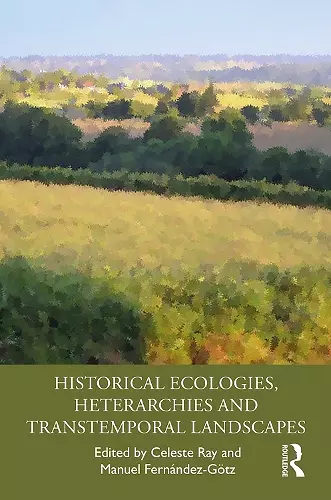Historical Ecologies, Heterarchies and Transtemporal Landscapes
Manuel Fernández-Götz editor Celeste Ray editor
Format:Hardback
Publisher:Taylor & Francis Inc
Published:9th May '19
Currently unavailable, and unfortunately no date known when it will be back
This hardback is available in another edition too:
- Paperback£44.99(9780367729745)

Interlacing varied approaches within Historical Ecology, this volume offers new routes to researching and understanding human–environmental interactions and the heterarchical power relations that shape both socioecological change and resilience over time. Historical Ecology draws from archaeology, archival research, ethnography, the humanities and the biophysical sciences to merge the history of the Earth’s biophysical system with the history of humanity.
Considering landscape as the spatial manifestation of the relations between humans and their environments through time, the authors in this volume examine the multi-directional power dynamics that have shaped settlement, agrarian, monumental and ritual landscapes through the long-term field projects they have pursued around the globe.
Examining both biocultural stability and change through the longue durée in different regions, these essays highlight intersectionality and counterpoised power flows to demonstrate that alongside and in spite of hierarchical ideologies, the daily life of power is heterarchical. Knowledge of transtemporal human–environmental relationships is necessary for strategizing socioecological resilience. Historical Ecology shows how the past can be useful to the future.
"This collection of papers is an excellent introduction to, and overview of, research in the field of Historical Ecology. The topic is especially timely, as archaeologists and historians think increasingly about how our understanding of interrelations between humans and their environments in the past can help us to understand changes happening in the present and to plan for the future. Chapters include discussion of theory and method, as well as case studies that demonstrate the application of the approach to changes in early societies in Africa, Asia, Europe, and North America. This book is valuable both for its explanation of the subject of Historical Ecology and for the information presented in the case studies."
Peter Wells, University of Minnesota, USA
"The work of Carole Crumley has impacted a broad audience of anthropological archaeologists for several decades now, with both her championing of Historical Ecology and her early transdisciplinary introduction of the heterarchy concept markedly influencing the field. By bringing together several contributors who have been significantly affected by her long and productive career, this collection is a robust encounter with Crumley’s influence and how her clear thinking has profoundly altered our assessment of archaeological method and theory."
Vernon L. Scarborough, University of Cincinnati, USA
ISBN: 9780815347750
Dimensions: unknown
Weight: 750g
322 pages